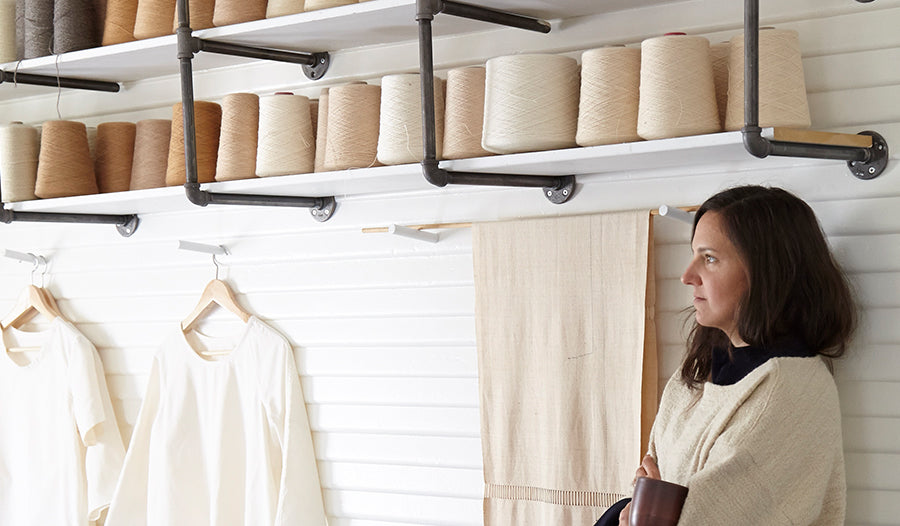
HEIRLOOM FIBRES LOUD AND CLEAR

Stockton, California-based weaver Adele Stafford is revitalising the industry by slowing it down: she not only collaborates with American farmers who raise sheep and grow cotton, but also weaves cloth from these natural fibers entirely by hand, using an 18th century dobby loom. Her Voices of Industry project – and label – tells stories via textiles, stories that are composed by farmer and weaver together.
Stafford named her endeavour after the Voices of Industry (VOI) newspaper, written and produced by workers during the American Industrial Revolution in Lowell, Massachusetts, from 1845-1848. VOI, with its emphasis on workers' and womens’ rights under industrialism, found a readership in the ‘Factory Girls’ who comprised some 75 percent of the labourers at the Lowell cotton mills. When the union leader Sarah Bagley became editor of the paper, she introduced a ‘Female Department’, inviting women to write and air their concerns.

In the spirit of Bagley, Stafford's Voices of Industry cultivates a relationship between producers and product. As she writes in her mission statement: ‘We consider the farmers who grow cotton and wool as co-conspirators and friends. We invest in the independent grower, the biodynamic alchemist and the punk rock shepherdess. Our work is an extension of agriculture and we care deeply about that origin.’
Stafford began Voices of Industry in 2013, after leaving her job in corporate design. Although her formal training was in glass-blowing at the Rhode Island School of Design, she had learned to weave as a child and decided to take a class to see whether weaving might give her direction. As she told One Kings Lane, ‘the first time I sat down at the loom again, I felt like I was at home.’

Today Stafford weaves on an Ahrens & Violette 16-shaft mechanical dobby loom, made in Chico, California. ‘I am drawn to the mechanical dobby for its place in history, invented just after the Jacquard mechanism,’ she wrote in an email. ‘Much of my curiosity with craft toggles between technology and the purity of the hand. The mechanical dobby allows for embracing a bit of both, without being tethered to the grid.’ Stafford continued, ‘I am still forced to methodically plot out pattern using graph paper and setting the pattern through metal pegs along wooden bars. The tactile nature of the process keeps me viscerally connected to the transition from the material of yarn, to the finished cloth.’
Stafford is part of the slow fashion movement; not only must she take three-to-four days to ‘dress’ her loom, but also the hand-weaving process is such a physically rigorous activity that she limits herself to five hours a day. Each month she is able to complete 15-20 pieces. And before she can even sit at the loom she must harvest her raw materials and spin them into yarn.

Image: Heirloom cotton courtesy Fox Fibre. Sally Fox will also be taking part in the Cotton talk on 11 May.
She has famously collaborated with skilled farmers, like Sally Fox at her Viriditas Farm, Capay Valley, California, which produces organic cotton in its natural colours; and Seth and Sharon Dubuc at Black Thorn Farm, Sandy Mush, North Carolina, who breed English sheep. The farmers' presence – and their stories – are very much part of each textile and garment Stafford creates. ‘I think of my work as being entirely rooted (forgive the pun) in agriculture,’ she said. ‘This original inquiry came from a disconnect I felt between yarn I would buy and the material origin of the fiber. In short, I couldn't easily link the two and this irked me.’
‘I believe that in order to really understand the material,’ Stafford continued, ‘I need to see it in situ before processing begins. And naturally, the stories of the people who cultivate the fiber influences how the fiber will take shape. My interest in these stories has shifted and has become more focused during the last few years. I am increasingly interested in the historical and cultural context of these fiber stories, tethering them to their historical arc...'
Extract from the article Loud and Clear: Voices of Industry speaks of heirloom fibres, written by Kate Cavendish in Issue 83 Cotton.

We're excited to be hosting an online talk on Wednesday 11 May which will bring together academics, cotton producers, designers and cotton activists, including Adele Stafford, to discuss the legacy of cotton from historical and contemporary perspectives.
Adele will speak on cotton's complicated and sordid narrative, in spite of its ubiquity as a dominant natural fibre. Through both historical and contemporary examples, she'll examine cotton's agricultural legacy and its role in a vastly changing climate.
Book tickets and find out more about the event here:

